Short profiles of SARE-funded research and education projects in action.
Showing 1-20 of 36 results
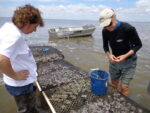
Down by the Bay: Project Supports Safe Oyster Production
Oyster production is a key contributor to the local food economy in New Jersey’s Delaware Bay. The “merroir” of the Bay’s tide flats gives oysters their unique and desired taste. However, recent increases in illnesses caused by raw oyster consumption threaten the Bay’s oyster farming future. The culprit is Vibrio parahaemolyticus (Vp), a bacterium commonly […]
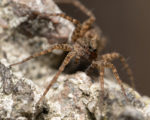
Spiders Provide Conservation Biological Control on Farms
Spiders were the focus of a Northeast SARE Graduate Student Research Grant project conducted by University of Maryland student Dylan Kutz. Kutz was interested in studying these undervalued yet important sources of natural insect control. He said, “Spiders are the most abundant natural enemy that occur in most agroecosystems and are estimated to globally consume […]

NJ farm evaluates oyster seed nursery practices
Oyster farming is increasing in the Northeast and is a top contributor of our region’s $161 million in annual aquaculture sales. However, a major challenge to the continued growth of this shellfish crop is availability of oyster seed. Hatchery and nursery capacity for seed production is limited, and often the demand for oyster seed exceeds […]
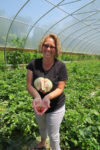
WV farm determines optimal strawberry planting dates
Strawberries are a high demand crop for both pick-your-own and local retail markets. While this crop commands premium prices, growing strawberries in southern West Virginia has been tricky due to challenges like deer and weed pressure, labor demands and planting time conflicts. With their Northeast SARE Farmer Grant, Kent and Jennifer Gilkerson of Sunset Berry […]
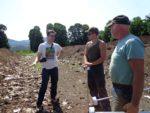
Dairy Farm Closes Loop with Improved Compost System
Eric Paris of Tamarlane Farm, a dairy in northeastern Vermont, has been closing the loop on his farm by composting farm waste and community food scraps (about 12 tons per week) to create a valuable fertility source for his farm fields. His Farmer Grant project sought to determine whether a low-cost Aerated Static Pile (ASP) […]
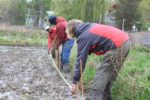
Hudson Valley Farm Applies African Farming Methods to Local Rice Production
Dawn Hoyte and Nfamara Badjie of Ever-Growing Family Farm in Ulster Park, NY received a Farmer Grant to evaluate nursery methods for rice production. Transplants are critical to growing this crop successfully in our region, given the short growing season. Past Farmer Grant research has shown that using a plug-tray nursery method was successful. Badjie, […]
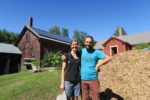
Small-scale Vegetable Operation Explores Solutions to Farming on Marginal Soils
How do small-scale farmers in rural and urban locations farm successfully on marginal soils? Jennifer Wilhelm of Fat Peach Farm in Madbury, NH conducted a Farmer Grant project to find out. Wilhelm had established no-till permanent raised beds on her one-acre mixed vegetable operation and her project investigated weed suppression, soil health and production potential […]
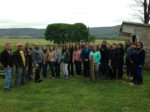
PA Extension reaches out to Hispanic and Latinx farming communities
As more people of color choose farming and agricultural careers, Cooperative Extension and other agricultural service organizations must expand their ability to serve culturally diverse groups. Pennsylvania saw a 16% increase in Hispanic and Latinx farmers and farmworkers, inspiring Elsa Sanchez of Pennsylvania State University to conduct a Northeast SARE Professional Development Grant project aimed […]
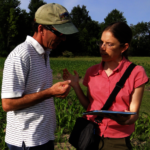
New technology for improving nitrogen management in corn
A multi-state Research and Education project, led by Cornell University’s Aaron Ristow and Harold Van Es, aimed to enhance nitrogen (N) management in corn acreage by calibrating a new tool, Adapt-N, and educating farmers about nutrient management. Adapt-N is a cloud-based computer tool that provides precise N fertilizer recommendations that account for seasonal weather conditions […]
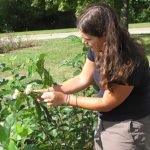
Developing native shrubs for the green industry
University of Connecticut associate professor of ornamental horticulture Jessica Lubell explored native shrubs as replacements for invasive plants through her Northeast SARE Research and Education project. To help wholesale nursery growers looking for alternative ornamentals that perform well in the Northeast, the project combined research trials of native shrub selections with an education program to […]
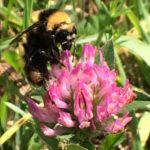
Northeast pollinator conservation planning short courses
Because native bees are significant contributors to crop pollination, their integration into farm systems—through conservation or restoration of natural and semi-natural areas, as well as the protection of nest sites and prudent insecticide use—is essential to agricultural production over the long-term. Led by pollinator program co-director Eric Mader, the national environmental non-profit, The Xerces Society, […]
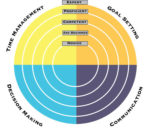
Maine training project focuses on interpersonal relationships for greater farm viability
Providing farmers with expert advice on production and farm management topics is the focus of much of the work conducted by Extension educators, nonprofit staff and other agricultural service providers. But what happens when the conversation with farmers veers beyond soil health, agronomy and animal husbandry to questions around communication, decision-making, goal-setting and time management? […]

Train-the-trainer program supports value-added and direct marketing education for Northeast farmers
Northeastern producers frequently consider direct marketing and value-added product development to increase revenues on the farm. Food entrepreneurship requires different skillsets than production agriculture. And, introducing value-added foods to the marketplace opens the seller to unique business liability. Therefore, it is important that farmers receive training and support to effectively set up and manage local […]
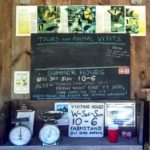
Supporting the development of agritourism in the Northeast
Northeast farmers are increasingly reliant on agritourism to expand farm income, create employment for family members, and strengthen relationships within the local community. This multi-state (NJ, VT, DE, and ME) Professional Development project, led by Brian Schilling of Rutgers University, provided training to agricultural educators to better assist the farmers with whom they work to […]
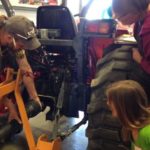
Breaking barriers: Building capacity to provide tractor education
Unskilled farm equipment operation can put farmers at serious physical and financial risk. Lack of knowledge about this equipment can limit farm scale and productivity, and therefore the farm’s ability to provide a sustainable family income. Yet new farmers (including apprentices, interns and employees) increasingly come from non-farm backgrounds and have limited experience with machinery. […]
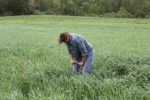
Cornell team digs into cover crops as livestock feed
Cornell University agronomist Quirine Ketterings conducted her Northeast SARE Research and Education project to better understand the incorporation of winter cereal cover crops— triticale, winter rye and wheat—into silage corn rotations. This double crop system enables farmers to provide both corn and cover crops as livestock feed. Because growing cover crops as dairy forages means […]
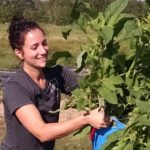
RI student studies production and marketing potential of amaranth
Amaranth is a traditional leaf vegetable in over 50 countries, yet little research exists on growing this crop in temperate climates like the Northeast U.S. University of Rhode Island student Sarah Schweig saw the potential that this crop might hold for farmers looking to diversity their farms in our densely populated, ethnically diverse region. Therefore, […]
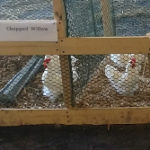
Penn State student studies poultry bedding alternatives
In the Northeast, wood shavings are the predominant bedding material on which commercial broiler chickens are raised. Because their availability and cost fluctuates and new concerns have emerged around biosecurity risks of transporting bedding to and from farms, Pennsylvania State University Master of Science student Amy Barkley used her Northeast SARE Graduate Student grant to […]
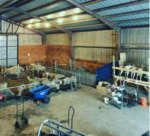
Sustainable year-round sheep milking management
The U.S. sheep dairy industry is currently a seasonal business as traditional dairy sheep breeds tend to follow an annual 180-day lactation. With her Northeast SARE Graduate Student grant, Nikola “Niko” Kochendoerfer of Cornell University, explored the possibility of year-round sheep milking management using meat breed ewes (Finn and Dorset crossbreeds). These breeds are capable […]
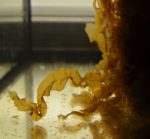
UMaine student explores temperature tolerances of kelp
As a sea vegetable, kelp may help Northeast acquaculturists diversify their businesses and contribute to this multibillion-dollar industry. Charlotte Quigley, a PhD student at the University of Maine, used her Northeast SARE Graduate Student grant to study Alaria esculenta, a kelp that is of interest to U.S. growers due to its market potential, nutritious and […]